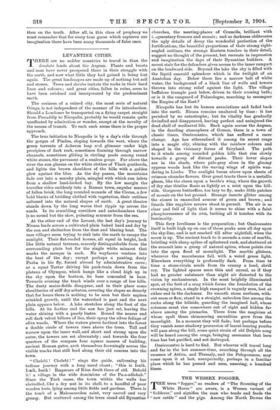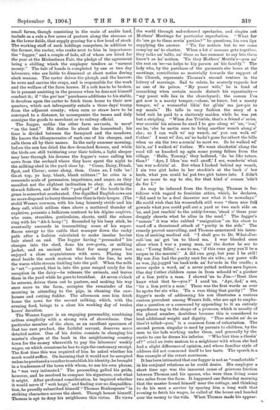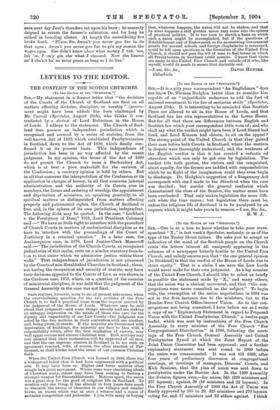THE WESSEX FOGGER.
ITHE term " fogger," as readers of "The Scouring of the White Horse" are aware, is a Wessex variant of " fodderer," and signifies the man who tends and feeds the " cow cattle" and the pigs. Among the North Downs the
small farms, though consisting in the main of arable land, include as a rule a few acres of pasture along the streams or in the lower fields, that supply grazing for a few head of stock. The working staff of such holdings comprises, in addition to the farmer, the carter, who ranks next to him in importance, the "fogger," and a couple of lads, all of whom are hired for the year at the Michaelmas Fair, the pledge of the agreement being a shilling which the employer tenders as "earnest money." The tale of hands is completed by one or two day labourers, who are liable to dismissal at short notice during slack seasons. The carter drives the plough and the harrow, he sows and carries the crops, and is responsible for the work and the welfare of the farm horses. If a colt has to be broken, he is present assisting in the process when he does not himself conduct it; if "the guv'nor" purchases additions to his stable, it devolves upon the carter to fetch them home to their new quarters, which not infrequently entails a three days' tramp from the adjacent county; when corn or straw have to be conveyed to a distance, he accompanies the teams and duly consigns the goods to merchant or to railway official.
The fogger, unlike the other farm servants, is never "on the land." His duties lie about the homestead ; his time is divided between the farmyard and the meadows. He knows the idiosyncrasies of each one of his charges, and calls them all by their names. In the early summer morning, before the sun has dried the dew-drenched flowers, and while the birds are still twittering over their toilets, a light sleeper may hear through his dreams the fogger's voice calling his cows from the orchard where they have spent the night to the milking-shed in the yard close by. "Come, Daisy, Dinah, Spot, and Clover; come along, then. Come an, I tells 'ee ! Ge-et tup, ye lazy, blank, blank critturs !" he cries in a crescendo scale of persuasion, impatience, and anger, as they manifest not the slightest inclination to obey. A sounding thwack follows, and the soft "pad-pad" of the hoofs in the grass is somewhat accelerated. Our dignified English cows are no more disposed to hurry themselves than is their keeper. (The stolid Wessex cowman, with his long leisurely stride and his deep call, which seldom rises above a muttered thunder of expletive, presents a ludicrous contrast to his Alpine confrere, who runs, stumbles, gesticulates, shouts, until the echoes ring with his "4h-li houp !") Seconded by his busy stick, he eventually succeeds in transmitting some of his super- fluous energy to the cattle that scamper down the rocky path after a fashion calculated to make insular bovine hair stand on end. The fogger having "persuaded" his charges into the shed, dons his cow-gown, or milking jacket, and an ancient hat that for many years has enjoyed a close acquaintance with cows. Placing his stool beside the meek matron who heads the line, he sets the warm white stream tinkling into the pail. When the milk is "set "—poured, that is, into the pans ranged ready for its reception in the dairy—he releases, the animals, and leaves them in the yard while he goes to breakfast. At seven o'clock he returns, drives them out to pasture, and making his way once more to the farm, occupies the remainder of the morning in attending to the pigs, in cleaning the cow- houses and cutting fodder. The afternoon sees him fetch home the cows for the second milking, which, with the evening feed, brings to a close his working day of twelve hours' duration.
The Wessex fogger is an engaging personality, combining artless simplicity with a strong vein of shrewdness. One particular member of the class, as an excellent specimen of that too rare product, the faithful servant, deserves more detailed notice. One of his duties consists in changing his master's cheque at the bank in the neighbouring country town for the money wherewith to pay the labourers' weekly wages, on which occasions he has to sign the customary receipt. The first time this was required of him he asked whether his mark would suffice. On learning that it would not be accepted unless he produced a voucher to establish his identity, he brought in a tradesman of the town with whom, to use his own phrase, he "was very intimated." The proceeding galled his pride, however, and he resolved to compass his signature, cost what it might. After profound consideration, he inquired whether it would serve if "writ large," and finding size no disqualifica- tion, he proudly subscribed himself "Thomas Brakespeare " in striking characters across the sheet. Though honest himself, Thomas is apt to deny his neighbours this virtue. He views the world through sad-coloured spectacles, and singles out Mothers' Meetings for particular reprobation. "What fur do 'um go to them sewin' parties ? " be questions, his own lips supplying the answer. "Tis fur nothen but to see some comp'ny an' to chatter. When a lot o' oomans gets together, they talks an' talks, an' them as has summat to say lets them know't as ha' nothen. 'Tis they Mothers' Meetin's—you au' the rest on 'ee—as helps to kip parson an' his fambly." The lady who, by the purchase of the garments she hems at the meetings, contributes so materially towards the support of the Church, represents Thomas's second venture in the lottery of marriage. Sad to relate, he scarcely regards her as one of its prizes. "My pooer wife," he is fond of remarking when certain moods disturb his equanimity— "my pooer wife lies in the churchyard ; the oom an I've got now is a naesty temper,—clane, 'ee knaw, but a naesty temper, wi' a wunnerful likin' fur grein' ma jaw-pie to my meals." He tells in racy fashion the story of a brief suit he paid to a slatternly maiden while he was yet but a stripling. "When Joe Trimble, that's a friend o' mine, wur coortin' his missus he axed I to goo along wi"un, "cos,' sez he, she be sartin sure to bring another wench along o' she ; so I can walk wi' my wench, an' you can walk wi' t'other.' I went wi' Joe, an' us hadn't gone far athert the hills when us sin the two a-comin' to meet we. So he walked wr his'n, an' I walked wi' t'other. We went shocketin' along the road till us knocked up agin some young fellers from the village. Hello, Tommy,' they hollered, do 'cc like tatters, then?' Aye, I likes 'um well anuff,' I sez, wonderin' what 'um wur a-drivin' at. But when I looked behind my wench, I sin two girt holes in her stockin's at the back o' her heels, what you could ha' put two girt taters into. I didn't ha' no moor to say to she, fur that kind o' ooman 'udn't do fur I."
As may be inferred from the foregoing, Thomas is fas- tidious with regard to feminine attire, which, he declares, "did used to be a deal da,center nor what it be nowadays." He could wish that his womenfolk still wore "them nice full gownds what you could pull out a yard or two each side on 'ee, and just reachin' to the ankly-bwuns, 'stead o' these year draggly skeerts what be allus in the mud." The fogger's " ooman " it was who rubbed "emigration" on his chest to ward off a threatened attack of "purity in the side." The remedy proved unavailing, and Thomas announced his inten- tion of seeking medical aid. "I shall goo to Dr. What-d'ee- call-'um an' get 'un to blood m& I wur blooded once afoor when I wur a young man, an' the doctor he sez to ma : Young feller,' a sez to ma, 4 if this runs grey you'll be a carpse in the marnin'.' A did run grey, but year I be still ! My son Jim had the purity onst fur six wiks ; my pooer wife as was, jig-jogged 'un back'erds an' for'erds in the cradle; a never spake a word, an' a never yetted nothen save liquors. One day t'other childern came in from schoold wi' a picsher of a lion yeten a man. I showed 'un to Jim—' Dust thee knaw what that be—you ?' I axed 'un. 'Aye, dad,' a sez, "tis a lion yeten a man.' Them was the first words as ever he spoke fur six wiks. 'Tis a. rum thing that purity !" The fogger's mode of addressing his son illustrates a curious custom prevalent among Wessex folk, who are apt to empha- sise a question or a command by appending to it an entirely superfluous tag in the shape of a pronoun, which is usually of the plural number, doubtless because this is considered to lend additional weight and dignity. "Thee mindst an' do as thee'rt telled—you," is a common form of exhortation. The second person singular is used by parents to children, by the men to the lads working under them, and generally by the rustic to one he deems his inferior. "Who bist thee a-theein' of?" cried an irate matron to a neighbour with whom she had had a slight difference of opinion, and whose familiar style of address did not commend itself to her taste. The speech is a fine example of the retort courteous.
It has been intimated that our fogger is not as "comfortable" in his conjugal relations as he could desire. His employer a short time ago was the innocent cause of grievous friction between Thomas and his spouse, who were then living some two miles from the farm. It happened one Saturday morning that the master found himself near the cottage, and thinking to do his man a service by sparing him a long walk that evening to fetch his wages, he called at the house and handed over the money to the wife. When Thomas made his appear.
ance next day Jove's thunders sat upon his brow ; he scarcely deigned to return the farmer's salutation, and for long he sulked in brooding silence. At length the smouldering fire broke forth. " Pl'a,se, Sir, dwun't you never goo fur to do that agen ; dwun't you never goo fur to gi'e my ooman the wages agen. She didn't knaw afoor what money I tuk, 'cos, Ink 'ee, I on'y gin she what I choosed. Now she knaws, an' I sha'n't ha' no moor peace sa long as I do live."








































 Previous page
Previous page